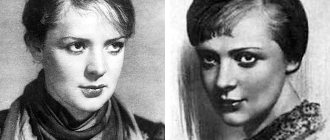Height, weight, age. How old is Aglaya Shilovskaya
After the participant in the show “Exactly the Same” earned the highest rating not only from the jury, but also from fans, the girl’s popularity rose sharply. Aglaya gave interviews, and directors began to invite the talented and beautiful young star to their film projects. The girl’s fans became actively interested in the star’s personal life, her vocal abilities, and also began Googling the artist’s own songs.
The actress’s appearance was not ignored either; fans admired her light brown hair, bright green eyes, and also wanted to know her height, weight, age, and how old Aglaya Shilovskaya was. The actress is 25 years old today, her height is 167 cm, and her weight is about 50 kg.
“The show “The Voice” is a mistake in my biography”
— Aglaya, for what purpose did you come to the show “Exactly”? — I was very glad to receive an invitation to the project. When I used to watch similar shows, it seemed to me that this was not for me. That’s why I wanted to take part in something I’m not good at, gain new skills, and try to overcome my fears, including. Actors profess two schools of acting: the school of transformation and the school of residence. I prefer the second one. Showing another person turns out to be quite difficult, because for me it is important to remain myself in any image. On the show "Exactly" I try on the features of famous people.
Anne Veski immediately recognized Shilovskaya and, having sung “A Sharp Turn” with her, wished her luck.
— Which images were the most difficult for you? - Alena Sviridova. It was difficult to grasp her character: she does not have a bright accent, a special timbre, or distinctive features. Therefore, it was both difficult and interesting.
— What is the difference between “Exactly” and “Variety Theater”? - In my opinion, “Exactly” is much more serious - the meticulous work of the make-up artists, the staging of the acting, the vocals. For “Exactly Exactly,” they put plastic makeup on us for about four hours. The level of filming is also incredible - as if they were filming a world-famous show. Many cameras, shooting points. For me, “Variety Theater,” roughly speaking, was a training session before “Exactly the Same.” I love the opportunity to perform world hits as I am a singing artist. I try to make the numbers at a high level. By the second half of the project, I began to realize that this show is what I’ve been going towards all my life. After all, the music I learned to sing on is exactly in the Exactly Exact repertoire: Christina Aguilera, Celine Dion, Whitney Houston, Scorpions. As a child, I tried to copy them. It's funny that now I'm doing the same thing, entertaining people. I was in love with Christina Aguilera. Her 2006 album Back to Basics shocked everyone in my family except my dad. That's why the Exactly Exact episode, in which I showed Aguilera, became special for me. This was the first program after which I didn’t want to take off my makeup. I can still spend hours looking at photographs of me as Christina Aguilera. Thanks to the make-up artists, they did a great job.
— You also came to “The Voice” with Christina Aguilera... — I chose the thing that she came up with for her charges on the American “Voice.” It was her arrangement of the hit House Of The Rising Sun that I sang.
- Nobody turned to you then... - But I was lucky in another way - I met Yuri Viktorovich Aksyuta (music director of Channel One. - Author). For this reason it was worth participating in this project. And now I’m very glad that I didn’t make it to “The Voice,” because then I wouldn’t have had either the “Variety Theater” project or the “Exactly Exactly” show. At first, I wanted to take revenge: come to “The Voice” next year and show what I can do. Because last time I sang, to put it mildly, imperfectly. I couldn’t even imagine that I would have to wait 10 hours for the performance. I don’t blame anyone - it’s my own fault, I couldn’t stand it psychologically. I think that “The Voice” is a mistake in my biography. And I would like to correct it on the Exactly Exact project.
When preparing for the image of Jennifer Lopez, the actress had to work hard.
Biography of Aglaya Shilovskaya
The actress was born in Moscow in 1993. The biography of Aglaya Shilovskaya, probably, could not be different, because she was born into a family of musicians and from childhood her parents closely watched her musical abilities. The girl was not at all afraid of the public, she sang and danced with pleasure, and at the age of three she is already a member of a musical children's group! At this age, many children still cannot read, but Aglaya was already “working” and performing on stage. Aglaya first appeared on stage when she was 4 years old. It was a production of “The Beautiful Miller's Wife,” where Shilovskaya played the Baron's daughter. Already at the age of five, the little artist passed her first exams in order to enter the school of Sergei Kazarnovsky’s acting studio. In the studio, the children were taught to sing, correct vocals and breathing were taught to them, and they also had dancing lessons.
After school, the artist submitted documents to the Shchukin School, and after receiving her diploma, the girl began working at the Moscow Operetta Theater, where she played in the plays “Monte Cristo” and “Prince Orlov”. Shilovskaya really suits lush dresses, and on stage she transforms into a real society lady.
Patriotic War of 1812
Mikhail met the Patriotic War of 1812 as the commander of a combined grenadier division. She actively participated in the defense of Semenov flushes. The first blow of the French fell precisely on Vorontsov’s division. It was attacked by 5-6 enemy units at once. And after the attack, the fire of two hundred French guns fell on her. The grenadiers suffered huge losses, but did not retreat. Mikhail himself led one of his battalions in a bayonet attack and was wounded.
Several hundred carts arrived at the Moscow palace of Count Vorontsov to remove family property and wealth accumulated over centuries. Nevertheless, Mikhail Semyonovich gave the order to take not property, but 450 military personnel onto the carts.
Filmography: films starring Aglaya Shilovskaya
In parallel with her performances on stage, the actress begins acting in films. Shilovskaya’s filmography begins in 2010, when she makes her debut in the film “In Jazz Style.” The aspiring actress immediately receives an award for her first role, the Natalya Gundareva Award in the nomination for best role. On the set of the film, the girl meets the director, and so ends up in the next movie, “My Crazy Family.” She plays on the same stage with Larisa Udovichenko, whom she always admired while watching the operetta “Die Fledermaus.”
The actress has established herself as an artist in the comedy genre, and Aglaya has other works in her collection: “Zaitsev+1”, “Courage”. In 2014, he starred for the first time in the science fiction film about psychics “The Miracle Worker.”
Personal life of Aglaya Shilovskaya
The personal life of Aglaya Shilovskaya has always been behind the curtain; the girl does not like to discuss her relationship with journalists, and has never given any reason for discussion. At one time, the media wrote that the actress was dating Ivan Stebunov, her partner in the film “My Crazy Family,” but these rumors were not confirmed; after some time, the actress herself said that their relationship was purely professional.
In 2020, the tabloids said that the actress was dating Fyodor Vorontsov. The couple was seen together several times, and when asked about the relationship, the star only smiled mysteriously, from which the journalists concluded that the girl was really in love.
Fyodor Vorontsov: “Three days before my dad passed away, I asked for a blessing for the marriage”
She was named after the heroine of Dostoevsky's novel, and she was lucky enough to meet her Fyodor Mikhailovich. Fyodor Vorontsov and Aglaya Shilovskaya saw this as a symbol and on August 11 of this year, secretly from the press, they officially formalized their relationship. Not only in the registry office, but also in the church. Our conversation with the newlyweds is about the interweaving of artistic fiction with life’s drama.
- Guys, as I understand it, it was no coincidence that you made an appointment for me at a sports bar, where football is constantly broadcast, because Aglaya now watches matches with her husband, as before with her father...
Aglaya: I’m not a fan, but I understand the game and continue to watch the championships - only at home, on the big screen. Both in our apartment and in my parents’ apartment, you can constantly see the green background of the lawn on TV. Moreover, if my dad and I support Dynamo, then Fedya supports CSKA. It’s good that it’s not for Spartak.
Fedor: If it had been different, my father simply would not have given Aglaya in marriage to me.
Aglaya: Yes, I’ll tell you a secret that I met a young man, a Spartak fan, and everything was upset. But here, on the contrary, it grew together. And even Fedor’s eight-year-old son Matvey adores Cristiano Ronaldo, plays football, goes to the Olympic reserve school, and we believe that one day he will become a star.
Fedor: True, so far he shows more promise in the art of commentating, which, in fact, is also not bad.
— Aglaya, it turns out that you first met your child when he was just a baby?
Aglaya: On February 14, it will be seven years since Fedya and I have been together, and I first met Matvey when he was a year and a half old, and he was then standing in the middle of the room with a vacuum cleaner. And then about a year later he locked me in the toilet...
Fedor: This is a very funny story. I produced the play “Demons” with Yuri Petrovich Lyubimov at the Vakhtangov Theater, we had long rehearsals, and I asked Glashenka to sit with my son...
Aglaya: Glasha is my pet name. That's what my loved ones call me. In general, my family comes up with a new nickname for me almost every six months. And then Matyusha really locked me in the bathroom for the sake of laughter. The situation was extreme: the front door was locked from the inside - no one would save him, and in the next bathroom the bathtub was filled with water - and the child would definitely not be able to reach the tap to turn it off. I fell into a wild panic, sobbed and screamed, but some time later Matvey mastered the complex lock, guessed to pull the old door towards himself, and I was freed. That stressful situation, I must say, united us, and now we are friends. So the child has absolutely no trauma that the parents separated and now the dad has a new woman. I’m even on normal terms with Matvey’s mother Renata, we talk on the phone.
Fyodor: When we escorted Matvey to first grade, and then all of us together - I, Aglaya, Renata, godmother of Masha's son - found ourselves in the same kitchen, we were very pleased that all the rough edges had been settled and we were, in any case, one family.
“I had a wound from a previous breakup, I didn’t make any specific plans, and suddenly a man calls who introduces himself as Aglaya’s father and offers a meeting.”
— We got ahead of ourselves a little, you met at Shchuka, right?
Aglaya: Yes, I went to college when I was fifteen, and Fedya, despite our seven-year age difference, was only a year older than me.
Fedor: I grew up in an acting family, but I didn’t initially think about this profession. I didn't consider her masculine. Therefore, I first went to the Russian State University for the Humanities to study at the Faculty of Advertising and PR and at the same time was engaged in a small business. But I got burned and came to the conclusion that, unfortunately, this was not for me. Later I thought about sports journalism, but Moscow State University required already published materials, and I decided that it would be easier to enter a theater university. And so it happened. And most importantly, I liked it. It's scary to say, but I would even play for free. Work gives me the same pleasure as the sport I do in my free time. I was lucky - in the premises of the Vakhtangov Theater, where I have the honor to serve, there is a wonderful gym, bathhouse, and swimming pool. In addition, due to a back injury, I am forced, for medical reasons, to do special gymnastics every day. This used to annoy me, but now I’m even grateful for this circumstance for an excellent regime that allows me to keep myself in shape.
Aglaya: I’m not inclined towards sports - I’m incredibly lazy. Only swimming is a joy. My real passion is music. In my spare time I play the flute and the electronic piano that Fedya gave me.
- Fyodor, have you made any attempts to drag your wife to join you in a popular and, as it turns out, repertory theater with all the amenities?
Aglaya: I’m not ready to serve in the troupe yet. I agree to play only under contract, in one-time productions. As I did at the Operetta Theater, where I worked for six years with the musicals “Count Orlov” and “Monte Cristo”. I mostly act in films, and it’s difficult to coordinate a schedule if I’m working full-time. Moreover, I am a freedom-loving person; I inherited this quality from my father, director Ilya Shilovsky, who also hates being dependent on someone. In general, my dream is that Fyodor would write a play, dad would stage it, and I would play it, and we would all go on tour together. We are already taking the first steps in this direction. Fedya composed a play, and dad is now directing it at the Vakhtangov Theater. God willing, they will release the premiere next year.
— In your opinion, is the actors’ union a good thing?
Aglaya: I’m not at all sure about that. There will always be an element of competition. We know the examples and do not want to repeat them. For this reason, I am pushing Fedya into another area.
Fedor: Frankly speaking, at first I was jealous of Glasha’s media presence, its success, and earnings. But then I killed this feeling in myself, because I felt how cool it was to do something together. Perhaps cinema is still ahead of me. I don’t want to waste my money on anything, fortunately the theater salary allows me to do this, but they don’t approve me for the films I’m aiming for. Becoming famous is not an end in itself. I'm not used to pretending to be something. Not one of those actors who, going on stage in the evening as Othello, refuses to take out the trash and wash the dishes in the morning. I can also nail a shelf if necessary. Housekeeping doesn't scare me. In the future, perhaps I will start farming, build a house...
“I noticed how restrained and decent Fedya is - even when everything was completely bad in his family, he remained absolutely closed to other women”
- Apparently, everyday life doesn’t bother you both at all...
Aglaya: I'm a bad housewife. I hate cleaning and dusting. It was my dad who spoiled me - he always forgave me as a little girl for my creative disorder and defended me to my mother when she called on me to put everything in its place. Now Fyodor Mikhailovich is suffering because of this.
Fedor: That's not true. Aglaya washes and irons and has learned to cook. When we first started dating, we once invited my friend to visit, and she treated us to “glashman,” as my friend called this dish. It was overcooked, semi-cold rock buckwheat. We struggled to swallow a couple of spoons so as not to offend, but it was a real challenge. Now Aglaya cooks borscht amazingly, this is her signature dish. And he copes with others too. In principle, we do not clearly distribute responsibilities around the house: whoever is not busy now does what is needed. We don't fight over such trifles.
Aglaya: Even when I’m tired, having arrived from a performance, Fedya will always help me take things out of the washing machine, hang them up... He’s perfect. (Laughs.)
— Your relationship, in fact, grew out of friendship. Before your eyes, Fedor became a father, you were aware of each other’s affairs...
Aglaya: I remember how I congratulated him on the birth of his first child, we looked at the photographs. I noticed how restrained and decent Fedya is - even when everything was completely bad in his family, he remained absolutely closed to all other women. They'll just slam you energetically - you won't be able to get through. It was only when he left home that things gradually began to change. He invited me to visit...
Fedor: It’s great that Glasha took the initiative in bringing us closer together. We unexpectedly saw each other differently.
- If it’s not love at first sight, there’s no point in asking about first impressions...
Fedor: Why! I remember entering the classroom and seeing a man with a child. It was seventeen-year-old Glasha. But then she looked exactly like that with her classmate. Glasha smiled with a childish smile, the light from the window fell on her, and she resembled a Madonna.
Aglaya: And I have a picture: I’m sitting on the first floor of the institute, Fedya enters the room, his classmates immediately literally surround him, they say something, and I think to myself: “What a handsome guy!” Then I ended up at his show, where the lights suddenly went out, and Fedya, improvising, acted out this moment quite funny. Fyodor Mikhailovich's sense of humor is one of his most powerful weapons.
“When dad was in the hospital, waiting for an operation, I began to think: what should I do while he is alive? The decision came on its own: to ask for blessings for the wedding.”
— Aglaya, in interviews you have repeatedly admitted that in relationships you like to be such a capricious girl and give the palm to the man...
Fedor: This is the true truth. I am the director of the theater, but I pretend that Glasha is the main director and artistic director. Aglaya, after all, has a strong core and a clear understanding of what she wants. It was this combination of femininity and strength, in addition to beauty and everything else, that attracted me. With an insatiable desire to control everything and everyone, Glasha was nevertheless raised in a classic family where the man is in charge, so she dreams of being led by the hand. I'm struggling with all of this. Both with the girl and with the rod. But at the same time I adore and idolize.
Aglaya: You know, we are intangible people, we do not concentrate on luxury goods, on some stylish furnishings and live by other values. It is important to us what kind of person is nearby. When I moved to Fedor, I didn’t care that a classmate was temporarily living with him, and he didn’t like me. Fyodor promised him shelter for a while and could not help but keep his word. I had to put up with a stranger. And also washing dishes in the bathroom, since the sink was broken... It was difficult, but we didn’t focus on it.
“Fyodor, father’s daughters usually have a hard time tearing themselves away from the hearth, and the head of the family strictly monitors his gentlemen. How was your relationship with your future father-in-law?
Fedor: Today we are friends. And then, six months later, after we started dating Aglaya, I still had a wound from the previous breakup, I didn’t make any specific plans, and suddenly some person called me, introduced himself as her father, and demanded a meeting. Well, of course, I agreed. We talked for eight hours in the House of Cinema.
Aglaya: I was eighteen years old, I was already earning money myself, and they forced me to come home at eleven. I freaked out, went to Fyodor, whom I fell in love with before he fell in love with me, and thus unknowingly provoked this conversation. I don’t know what they were talking about, but everything worked out in the best possible way. They can still talk for several hours on the phone.
Fedor: It seems to me that Ilya Vsevolodovich was convinced of my most decent attitude towards his daughter. In addition, he was bribed by my concern for my grandmother. During our conversation, she called me from St. Petersburg, I apologized, said that this was sacred, and answered the phone, which clearly aroused respect. Well, football turned out to be useful. In general, through Glasha’s mom and dad, I fell in love with her even more, they made such an impression on me - extraordinary, multifaceted and at the same time accessible, understanding, honest.
The couple has been together for 7 years
Aglaya: The fact that Fedya was accepted and loved by my family was also a determining factor. I would absolutely not be able to live in permanent hostility with my relatives. After all, if those whom you trust unconditionally do not like your chosen one, then there are still adequate reasons. And today, if we quarrel, throw objects (and this happens often - we are an Italian family by temperament), my wise parents, provided that I am wrong, prove this to me with reasoning, taking my husband’s side, and this is pleasant. Of course, we behave selfishly by interfering with them in our relationships, but they are first-class psychologists and know how to instantly reconcile us. I am, in principle, a person prone to depression and panic attacks; it is even written in my rider that my mother must be present with me everywhere on the set. I can’t carry Fyodor with me everywhere! And my mother calms me with her presence. So if fifteen-year-old me was thrilled that, as an adult, I was going alone on a filming expedition, then at the moment it’s difficult for me to tear myself away from the family that gives me warmth.
— Aglaya, did Fyodor’s parents also like you, a girl from a famous family?
Aglaya: Yes, and I wasn’t afraid of an important meeting with Fedya’s parents - we are colleagues! I have an exceptionally warm relationship with Fedya’s mother; I can call her, talk to her and complain about something. And with dad, who, alas, passed away this year, we just had a separate love. When I sang “Tbiliso” to him in Georgian, Mikhail Ivanovich was subdued. And how we happily celebrated the birthday of the Shchukin School - all four of us got drunk as hell!
Fedor: Three days before my dad passed away, I asked for his blessing for my marriage with Glasha, and he gave it to me.
Aglaya: We had a quiet wedding, and in terms of the grandeur of emotions it cannot be compared with March 23, the day when Fedya asked me to become his wife. It was so beautiful! Like in the movies! I couldn’t even imagine anything like this, although I had been waiting for an offer for a long time. It happened like this: I was filming in Crimea, and one weekend my mother and I agreed to go see the palace of the royal family in Livadia. For about five days now, my mother began to behave strangely - she was immersed in telephone correspondence, but I did not attach any importance to this. On the way, I wrote messages to my dad, but he didn’t answer me, which was out of the ordinary. In Livadia, my mother began to intensively call me for some reason, first to the church, and not to the palace. There I lit a candle - and then I saw Fyodor coming in with flowers. I was shocked! We left the church, he handed me his great-grandmother’s ring, I saw my dad filming this scene and burst into tears... What made the situation comical was the fact that tourists passing by at that moment, recognizing me, rushed to me, roaring, for autographs, but when they saw him proposing Fedora with the ring, stopped and waited with curiosity to see how it would all end. We had already lived together for six years, and I thought that we would get married just as casually, but Fedya was able to surprise me and organized a celebration. A romantic fairy tale.
— Has legal marriage changed anything?
Fedor: For me, no. My parents got married very late, and I never understood why it was necessary. Then I realized that if I love a woman and she wants a wedding, then I shouldn’t resist. When dad had already left in the spring and was in the hospital, awaiting surgery to amputate his leg, I arrived at their apartment on Arbat, lay down on the bed and began to think about what I needed to do while he was alive. The decision came naturally - to ask for blessings for the wedding with Aglaya.
Aglaya: We had such a swing: our happiness - and then tragedy... After the wedding, I immediately felt the difference in the relationship before and after. I have become much calmer, more peaceful, internally I am already making concessions with myself. And Fedya, perhaps, is not aware of it, but he has also become more tolerant and turns a blind eye to some things. It is obvious to us: this is forever, and we must go through all the difficulties together, lie down with bones, so that the family does not fall apart.
— Besides creative ones, what other joint plans do you make?
Aglaya: Now our first priority is our daughter! We even came up with a name for her. And another boy.
Fedor: And so that the game never disappears from our life together. So that this internal connection, a living emotion based on attention to each other, sometimes ironic provocation, never breaks. But this is my personal goal.
Family of Aglaya Shilovskaya
The family of Aglaya Shilovskaya did a lot for the girl’s development as an actress. She is a third generation artist. The actress’s grandfather is an actor of Soviet cinema and theater, Vsevolod Shilovsky. The girl’s father, screenwriter and director Ilya Shilovsky, followed the girl’s development from an early age and was afraid not to miss the moment when Aglaya showed her creative potential.
The artist’s mother, Svetlana, studied music with her every day, took her to clubs and constantly paid attention not only to her lessons, but also to her creativity. Thanks to this, Aglaya sings well, draws, dances, and has become a very popular artist, as well as a participant in the show “One to One,” where she also performs as a parodist.
Children of Aglaya Shilovskaya
Children of Aglaya Shilovskaya are still only in the girl’s plans. In 2020, it became known that the artist got married, and fans immediately thought that perhaps the actress was pregnant and expecting a child, but the star did not marry for love, but for love, and she and her husband do not yet plan to have children.
The star believes that in order to give birth to offspring, you must first become established as a person. She has many aspirations and plans, Aglaya wants to act in films, and dreams of serious film work, such as a drama, historical or war film, so she devotes a lot of time to self-development and goes to castings. With this approach, we think that fans should not expect a quick addition to the family, but this is good, it means that Shilovskaya will delight her viewers with new works, and will not go on maternity leave.
Support for Khodorkovsky's structures
Vladimir Vorontsov decided to implement a win-win scheme for misleading people for financial gain. Official registration of a trade union not only provides a number of preferences in the organization of work, but also imposes various restrictions, while increasing responsibility. Having announced his desire to “legitimize” his “Police Ombudsman”, keeping silent about the reasons for the refusal to register, Vorontsov presented himself as a “victim of the system.”
Violations of the law by the “Police Ombudsman” and Vorontsov personally did not affect the growth of the audience gained through scandalous situations and fake news. Mikhail Khodorkovsky ’s structures are helping the public administrator with this . Having financial and media support from the oligarch, Vorontsov does not miss the opportunity to enrich himself at the expense of citizens, creating favorable conditions for himself and collecting money as donations.
Aglaya Shilovskaya's husband - Fyodor Vorontsov
Aglaya Shilovskaya's husband is Fyodor Vorontsov, an actor at the Vakhtangov Theater. The young people met in a creative environment, and for some time they simply talked, and then a romance began between them. The young couple also kept preparations for the wedding and marriage proposal a secret so that journalists would not spoil the holiday. The ceremony took place last year.
Recently, the artists gave a joint interview after the wedding, where they talked about life on the other side of marriage. Fedor has a very regular family and a good relationship with his parents. Fedor also told reporters that his father had recently died, the guy asked his blessing for marriage, and received it.
Biography[ | ]
In August 1528 he stood in Vyazma. In August 1530 he was on the banks of the Oka, opposite Lublin. In 1531 - the second governor of the regiment of the right hand of Odoev, for protection from the Crimea. Participated in 1531 and 1532. in two embassy commissions: on the affairs of Kazan and sent to Lithuania for the exchange of letters [1].
He did not play a prominent role during the reign of Elena Glinskaya and Shuisky; but he managed to win the love of the growing Ivan IV. In 1539, as a Uglitsky butler, he was sent to the Ugra. The Shuiskys unsuccessfully tried several times to remove him from the yard; finally, in 1543, he was exiled to Kostroma. But at the end of the same year, the head of the Shuiskys, Andrei, was disgraced and executed. Ivan IV immediately returned his favorite from exile and appointed him chief adviser.
Vorontsov wanted unlimited power under the 14-year-old Tsar, getting angry, according to the chronicler, every time Ivan IV interfered in matters or favored one of the boyars. For this, in October 1545, Vorontsov was removed from the court, but, at the request of Metropolitan Macarius, he was soon returned[1].
Six months later, a new disgrace befalls him. When in 1546 Ivan IV himself was at the head of a detachment of Moscow troops sent to meet the Crimeans, Novgorod squeakers once stopped him and began to hit him with their foreheads about something, Ivan ordered his servants to send them away; At the same time, a fight broke out between them, and several people were killed. Ivan IV ordered his clerk, Vasily Zakharov, to investigate the matter; the latter reported that the Novgorod squeakers acted at the instigation of the Vorontsovs - Fedor and his nephew Vasily Mikhailovich, as well as Prince Ivan Ivanovich Kubensky. By order of Ivan IV, the accused were executed, and their close people were sent into exile[1].
Chroniclers say that the clerk slandered the boyars, and that Fyodor Semyonovich was guilty only of the desire to rule the state without any intervention from the tsar [1].
His son Vasily served as a governor during the Livonian War and in difficult times remained faithful to his duty to the end and fell with arms in his hands fighting the enemy.
Aglaya Shilovskaya nude
The girl believes that man is also the art of creating the world, so she is not shy about nudity and participated in candid photo shoots. This is not surprising; immediately after gaining popularity, such a beauty became an object of desire for men, and women look at Aglaya with admiration, especially when they hear her voice. In 2012, the girl posed for the first time for the men's magazine "Maxim", where Aglaya Shilovskaya appeared naked on the website of the online magazine.
The actress did not hesitate to show viewers her beautiful tanned body without any covering. The article was called “Earth Sugar,” and the girl’s body was covered in parts only by brown sand.
Carier start
In March 1801, Alexander I became emperor, and in May Vorontsov Jr. arrived in St. Petersburg. Here he met members of a literary circle, became close to the soldiers of the Preobrazhensky Regiment and decided to make a military career. At that time, Mikhail’s rank of chamberlain was equivalent to the rank of major general, but Vorontsov did not use this privilege. He was enlisted in the Preobrazhensky Regiment as an ordinary lieutenant.
However, the count quickly became tired of duty at court, drill and parade parades. In 1803, he went to Transcaucasia as a volunteer to join the army of Prince Tsitsianov. Here the young Count Vorontsov quickly became the commander's right hand. But he did not sit at headquarters, but actively participated in the battles. Therefore, it is not surprising that the captain’s epaulets appeared on his shoulders, and on his chest three orders: St. George (4th degree), St. Vladimir and St. Anna (3rd degree).
In 1805-1807, Count Vorontsov, whose biography is known to all modern military men, participated in the battles with Napoleon, and in 1809-1811 he fought with the Turks. Mikhail, as before, stood in the forefront of the attackers and rushed into the thick of the battles. He was again promoted and awarded orders.
View gallery
Photo by Aglaya Shilovskaya in Maxim magazine
In January 2020, new candid photos of the star appeared online. Photos of Aglaya Shilovskaya in Maxim magazine appeared directly on the cover of the magazine. The star's future husband did not forbid her to appear in men's magazines, so Aglaya appears naked in the pictures, as well as in underwear and a swimsuit.
In the photo, the girl stands tall in a men's white shirt and covers her chest with her hands. As men admit, one of the sexiest images of women is when they wear men's shirts on their naked bodies, so the star's photo shoot was in great demand. The photo shoot was called “lady under a veil,” and in different photos Aglaya tries on a black hat with a veil and jewelry on her naked body.
Biography
The son of Count Semyon Romanovich Vorontsov, the Russian envoy in London, and Ekaterina Alekseevna, née Senyavina. Godson of Empress Catherine II[3].
Early years
Count Mikhail Vorontsov was born on May 19 (30), 1782 in St. Petersburg, spent his childhood and youth with his father, Semyon Romanovich, in London, where he received an excellent education. Enrolled as a bombardier-corporal in the Life Guards Regiment as an infant, he was already promoted to warrant officer at the age of 4.
In 1803 he was seconded to the Caucasian troops, led by Prince Tsitsianov. He was attached to the commander-in-chief. On January 3, 1804, he took part in the assault on Ganja. On January 15 of the same year, he almost died during Gulyakov’s unsuccessful expedition to the Zagatala Gorge.
On August 28, 1804 he was awarded the Order of St. George, 4th class No. 650
| For excellent courage and courage shown during the siege of the Erivan fortress while repelling repeated attacks by the Persians. |
In September 1805, as a brigade major, he was sent to Swedish Pomerania with the landing forces of Lieutenant General Tolstoy and was at the blockade of the Hamelin fortress.
During the campaign of 1806 he was in the battle of Pułtusk.
During the campaign of 1807, commanding the 1st battalion of the Preobrazhensky Regiment, he took part in the Battle of Friedland.
In 1809, Vorontsov, appointed commander of the Narva Infantry Regiment, went to Turkey, where he participated in the assault on Bazardzhik.
In 1810 he took part in the battle of Shumla, then was sent with a special detachment to the Balkans, where he occupied the cities of Plevna, Lovech and Selvi.
During the campaign of 1811, Vorontsov took part in the battle of Rushchuk, in 4 cases near Kalafat and in a successful case near Vidin.
On March 10, 1812 he was awarded the Order of St. George, 3rd class No. 228
| In reward for the excellent feats of courage and bravery performed during the defeat of the Turkish troops in the battle of Viddin on October 19th. |
M. S. Vorontsov at the Monument “1000th Anniversary of Russia” in Veliky Novgorod
Patriotic War and foreign campaign
During the Patriotic War of 1812, Vorontsov was first with the army of Prince Bagration and took part in the battle of Smolensk.
At the Battle of Borodino, Vorontsov commanded the 2nd Combined Grenadier Division, which consisted of elite infantry regiments (grenadier). Throughout the entire battle, the division was on the Bagration flushes and therefore on the main direction of the French attack. The advancing French units constantly replaced each other, their attacks were punctuated by heavy artillery fire. Despite the huge losses (by the end of the battle, 300 out of 4 thousand people remained in the ranks), the division of General Count Vorontsov held its position until the very last opportunity. Count Vorontsov himself, while at the head of the division, received a wound with a bayonet in hand-to-hand combat, and after the battle he went to the rear for treatment[4].
Going for treatment to his Andreevskoye estate in the Pokrovsky district of the Vladimir province, Vorontsov refused to evacuate property from his house on Nemetskaya Street in Moscow, ordering the wounded to be taken out on carts. About 50 wounded generals and officers and more than 300 lower ranks were stationed in Andreevsky. The count took upon himself the costs of the wounded, which reached 800 rubles daily. After recovery, each soldier, before being sent to the active army, was supplied with clothes and 10 rubles[5][6].
Having barely recovered, Vorontsov returned to duty and was assigned to Chichagov’s army, and he was entrusted with a separate flying detachment. During the truce (summer of 1813) he was transferred to the Northern Army; upon the resumption of hostilities, he was in action near Dennewitz and in the battle of Leipzig.
During the campaign of 1814, Vorontsov brilliantly withstood the battle against Napoleon himself near the city of Craon. Awarded on February 23, 1814, the Order of St. George, 2nd class No. 64
| For distinction in the Battle of Craon. |
In the battle of Paris, commanding a special detachment, he fought and occupied the suburb of La Villette.
Command of the occupation corps in France
In 1815-1818, Vorontsov commanded the occupation corps in France.
A certain set of rules, compiled by Vorontsov personally, was introduced in the corps, limiting the use of corporal punishment for soldiers [5] [6]. His opinion on limiting corporal punishment is noteworthy[7]:
Since a soldier who has never been punished with sticks is much more capable of feelings of ambition worthy of a real warrior and son of the Fatherland, and one can more likely expect good service and an example from him to others...
In all divisions of the corps, by order of Vorontsov, Lancastrian schools for soldiers and junior officers were organized. Also, the count adjusted the regularity of sending correspondence from Russia to the corpus[5][6].
Before the withdrawal of the occupation corps, Vorontsov collected information about the debts of officers and soldiers to local residents and paid all the debts, the amount of which was about 1.5 million rubles, from his own funds. In order to pay off French creditors, he was forced to sell the Krugloye estate, inherited from his aunt, Princess Ekaterina Dashkova[5][6].
International connections
In 1818 he represented Russia at the Aachen Congress[8].
In 1819, simultaneously with P.M. Volkonsky received the Grand Cross of the English Order of the Bath.
Governor-General of Novorossiya
Prince Mikhail Semyonovich Vorontsov
Returning to Russia, Vorontsov commanded the 3rd Infantry Corps, and on May 19, 1823, he was appointed Novorossiysk Governor-General and Plenipotentiary Governor of the Bessarabia Region. The half-virgin Novorossiysk region was waiting only for a skillful hand to develop agricultural and industrial activities in it. Vorontsov owes: Odessa - a hitherto unprecedented expansion of its trade importance and increase in prosperity; Crimea - the development and improvement of winemaking, the construction of a magnificent palace in Alupka and an excellent highway bordering the southern coast of the peninsula, the breeding and multiplication of different types of grain and other useful plants, as well as the first experiments in forestry. At his initiative, the Society of Agriculture of Southern Russia was established in Odessa, in the works of which Vorontsov himself took an active part. One of the most important branches of Novorossiysk industry, the breeding of fine-wool sheep, also owes a lot to him. Under him, in 1828, shipping on the Black Sea began. On December 29, 1826, Vorontsov was elected an honorary member of the Imperial Academy of Sciences.
On May 24, 1826 he was appointed a member of the State Council. In the same year he was a member of the Supreme Criminal Court in the case of the Decembrists.
Together with Ribopierre, he was sent to Ackerman to negotiate with the Turkish commissioners regarding the disagreements that arose between Russia and the Porte. On September 25, 1826 he signed the Ackerman Convention.
In 1828, instead of the wounded Prince Menshikov, he took command of the troops besieging the Varna fortress. On August 17, Vorontsov arrived at his destination, and on September 28, the fortress surrendered. During the campaign of 1829, thanks to the assistance of Vorontsov, the troops operating in Turkey continuously received the necessary supplies. The plague, brought from Turkey, did not penetrate deep into the Russian Empire, largely thanks to the energetic measures of Vorontsov.
Elizaveta Ksaverevna Vorontsova, née Branitskaya
During the governorship of Count Vorontsov in Chisinau, and then before his eyes in Odessa, Alexander Sergeevich Pushkin was in exile (1820-1824). His relationship with Vorontsov did not work out right away; the governor viewed the exiled poet primarily as an official, gave him instructions that seemed insulting to him, and most importantly, his wife Elizaveta Ksaveryevna, née Countess Branitskaya, began a superficial affair with Pushkin to cover up her real love relationship, which greatly spoiled Pushkin’s life, since the count became the object of numerous caustic, although not entirely fair, epigrams by Pushkin: “They once told the Tsar that finally...”, “Half my lord, half merchant...”, “The singer David is small in stature...”, “I don’t know where, but not at us…"; Pushkin ridicules their pride, servility (from his point of view) and Anglomania of the governor.
Other writers of that time - A. S. Griboedov, G. F. Olizar, P. P. Svinin, etc.[9] — while traveling around Crimea, we visited Vorontsov’s hospitable house in Gurzuf, which the count, who lived permanently in Odessa and visited the peninsula only on short visits, owned until 1834. The Count cordially welcomed creative guests in his home in St. Petersburg on Malaya Morskaya; one of whom is G.V. Gerakov, who characterized Vorontsov as “ a friend of a rare
"Died right there on June 2, 1838[10].
Caucasus
Main article: Caucasian War
In 1844, Vorontsov was appointed commander-in-chief of the troops in the Caucasus and governor of the Caucasus, with unlimited powers and retention in his previous positions. Arriving in Tiflis on March 25, 1845, he soon went to the left flank of the Caucasian line to take command of the troops preparing for the campaign against Shamil. After occupying Andi, which involved the greatest difficulties, the troops, under the personal leadership of Vorontsov, moved to Shamil’s temporary residence - the village of Dargo. The capture of this point and, in particular, further movement through impenetrable forests was accompanied by great dangers and huge losses. The “Dargin” expedition, in fact, did not achieve its goal, since Shamil safely left the village, and the village itself was burned before the Russian troops arrived. The convoy convoy, which was on its way to join Vorontsov’s detachment, was attacked by the highlanders and was partially captured (“Sukharnaya” expedition). The retreat from Dargo was also accompanied by losses. Here is how eyewitness writer Arnold Lvovich Zisserman responded to those events:
Anyone can imagine what impression the outcome of the entire large expedition of 1845 made on our troops, on the Christian population of Transcaucasia devoted to us and on the hostile Muslim population. There is nothing to say about the triumph of Shamil and the mountaineers. Thus, I repeat, if it had not been for Count Vorontsov, who enjoyed great trust and respect from Sovereign Nikolai Pavlovich and stood above the influence of the intrigues of even the powerful Chernyshev, his Caucasian career would probably have ended with the end of the expedition...
However, despite the failure, for the campaign to Dargo, by a personal Highest decree of August 6, 1845, the Caucasian governor, adjutant general, Count Mikhail Semyonovich Vorontsov was elevated, with his descendants, to the princely dignity of the Russian Empire.
In 1848, two strongholds of Dagestan, the villages of Gergebil and Salty, were taken. In the bloody Battle of Salta, Vorontsov blocked and defeated a large detachment of highlanders from Naib Idris. In the same year, through the efforts of Vorontsov and on his initiative:
- The Caucasian educational district was founded[11].
- The port city of Yeysk was founded.
By a personal Highest decree of March 30, 1852, the Caucasian governor, adjutant general, cavalry general, Prince Mikhail Semyonovich Vorontsov was awarded, with descendants, the title of lordship.
Vorontsov - bibliophile
His father, Semyon Romanovich, and his father’s brother, Alexander Romanovich, began collecting books. Compiling book collections required a certain culture, freedom of funds, and the ability to travel around the country and abroad. The Vorontsovs had all this in abundance: their fortune was one of the largest in Russia, Semyon Romanovich lived permanently in England, Alexander Romanovich also served in the diplomatic line. Their book collections were typical of those of the 18th century, when the spiritual life of Europe was strongly influenced by the ideas of the French Enlightenment. The basis of the libraries was the works of Voltaire, Rousseau, Montesquieu; Attention was also paid to antiquities and manuscripts. Mikhail Semyonovich Vorontsov inherited a significant part of the collections of his relatives, including his aunt, Ekaterina Romanovna Dashkova[12]. Mikhail Semyonovich himself had been collecting books since his youth and did not give up this activity in the 1810s, when he was in Paris at the head of an expeditionary force.
M. S. Vorontsov had several book collections, both in Russia and abroad. The fate of the Tiflis library has not been fully clarified; the Odessa collection, at the will of the heirs, was transferred to the local university; the St. Petersburg collection passed to his son, Semyon Mikhailovich, after whose death it was sold through V. I. Klochkov’s store, and only the Alupka library was preserved, partially, in the palace’s own interior - museum[13][14].
Last years
At the beginning of 1853, Vorontsov, feeling the approach of blindness and extreme loss of strength, asked the sovereign to dismiss him from his post, and on March 25 he left Tiflis. Monuments were erected to him in Tiflis (with funds collected from voluntary donations from the city population), Odessa and Berdyansk.
On the day of the coronation of Emperor Alexander II on August 26, 1856, Vorontsov was awarded the rank of Field Marshal.
Vorontsov died on November 6, 1856 in Odessa. For many years, stories about the simplicity and accessibility of the Supreme Governor were preserved among soldiers in the Russian troops in the Caucasus. After the death of the prince, a saying arose there: “God is high, the Tsar is far away, but Vorontsov died.”
He was buried in Odessa in the lower church of the Transfiguration Cathedral.
Instagram and Wikipedia Aglaya Shilovskaya
Shilovskaya can be called a real child prodigy, because she graduated from school 2 years earlier than her peers. Exact sciences, languages, and creativity, everything came to Aglaya with ease, and at the age of 15 she had already graduated from school. Shilovskaya entered the musical theater actor course, where she was able to demonstrate all her skills, and quickly became one of the best students in the course. However, a constantly busy work schedule greatly interfered with her studies towards the end, and Aglaya did not have time to do anything and skipped classes.
Her friend, Alena Chevik, helped the girl stage the graduation play “Once Upon a Mattress,” where Aglaya played the princess. Instagram and Wikipedia Aglaya Shilovskaya will tell about her personal life and new works to all those who love the girl’s work.
Privileged class
Representatives of the Vorontsov surname belonged to various classes:
- Boyars
From the half of the 15th to the end of the 17th century. The Vorontsovs served as governors, solicitors, stewards, okolnichy and boyars. Gavrila Nikitich Vorontsov, centurion of the Streltsy army, died during the siege of Chigirin in 1678. - Larion Gavrilovich Vorontsov (1674-1750), son of Gavrila Vorontsov, steward and governor in Rostov the Great.
- Nobility
.
The Vorontsovs are an ancient noble family. Officially, the Vorontsov family tree is derived from the legendary Shimon Afrikanovich, who left the Varangian land for Kyiv in 1027. A complete record of the descendants of Shimon, who was baptized as Simon, does not exist. But such a record is kept from the boyar Protasy Fedorovich. On behalf of his son Veniamian Protasyevich, the surname Velyaminov. The immediate ancestor of the Vorontsovs, the grandson of Velyamin Protasyevich, is Fedor Vasilyevich Voronets Velyaminov (about 1400).
| "Coat of arms of His Holiness Princes Vorontsov" | Representatives of the family Vorontsov - two princely families that had the Highest approved coats of arms and were included in the Genealogical books of the Noble Deputy Assembly:
|
| "Coat of arms of Counts Vorontsov" | Mikhail Illarionovich, lieutenant general, eldest son of Larion (Illarion) Vorontsov), chancellor. In 1744, Emperor Charles VI granted him the dignity of count of the Roman Empire, and at the same time he was allowed to use this title in Russia. His brothers Roman and Ivan Illarionovich were granted counthood in 1760 by Emperor Francis I; this dignity was recognized for them in Russia only in 1797. Representatives of the family Vorontsov - a count family that had the Highest approved coats of arms and was included in the Genealogical books of the Noble Deputy Assembly:
|
| Representatives of the family Vorontsov entered:
| |
| "Coat of arms of Counts Vorontsov" | Representatives of the family Vorontsov-Dashkov - the count's family is included in the Genealogical Books of the Noble Deputy Assembly:
|
| "Coat of arms of the Velyaminov-Vorontsov nobles" | The Vorontsov-Velyaminov branch comes from Vasily Ivanovich, who was the steward of Tsarina Praskovya Feodorovna from 1686 to 1692. Representatives of the family Velyaminov-Vorontsov (Vorontsov-Velyaminov) entered:
|
| “Coat of arms of the nobles of Prince Vorontsov-Count Shuvalov | Representatives of the surname of Prince Vorontsov - Count Shuvalov are included in the Genealogical Books of the Noble Deputy Assembly: |
- Boyar children
. The children of the boyar Vorontsovs were placed in different cities. Some of them served in Arzamas. Some of their descendants moved from Arzama district to Simbirsk district. Then one branch moved from the Simbirsk district to the Buzuluk district of the Orenburg province. Their descendants - the Vorontsov nobles - lived in Buzuluk, Buguruslan districts and Samara.
During Peter’s reforms in the 18th century, the “children of the boyars” were transferred to the class of “odnodvortsy” [1]
- Service people
. Representatives of the surname are mentioned: Zemlyansky district in the Collapsible book of service people of various ranks of Zemlyansk. 1679-80 p.2 as “soldiers from the previous elections and Ivanov’s regiment of Gast and since 187 have been serving in Boldvin’s Martinov regiment” and living in the city of Zemlyansk, Voronezh province. - in the Book of Scribes and Landmarks, letters and measures of the clerk Nikita Telegin and the clerk Trofim Antsyforov, 194 (1684) in the Zemlyansk district as the Cossacks serving as policemen in the city of Zemlyansk, Voronezh province.
In the 18th century, with a change in the social structure, many urban Cossacks became part of the odnodvortsy [2].











